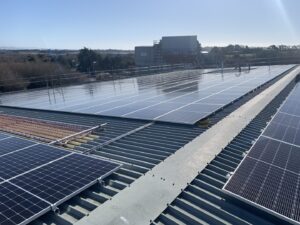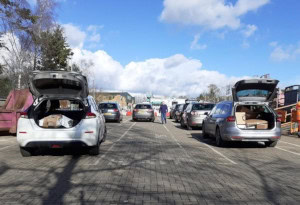The solar panels have been installed on the roofs of the Poundbury waste depot in Dorchester and the Crookhill waste depot in Chickerell.

The Crookhill site suffered damage in a fire in November 2020. While there was only minor smoke damage to the main building, the council lost most of its refuse collection fleet.
The estimated loss was expected to be in the region of several million pounds, but the council said its insurance arrangements “cover us for such an incident”.
Solar panels
The 302 solar PV modules installed on the roof of the Crookhill site’s main building are expected to produce around 135,180 kWh of electricity. This equals to 36 homes’ power and saves around 30 tonnes of carbon emissions annually.
The panels are expected to provide 70% of the power needed at the depot but “will always generate as much power as they can” and any surplus of energy generated on sunny days “will feed into the national grid”.
The Poundbury depot has had 182 panels added to its roof. These are expected to generate more than the site’s annual usage and save around 18 tonnes of carbon emissions per year.
Renewable energy
The move to renewable energy comes as part of the public sector decarbonisation scheme. This saw the council awarded £19m of government funding in a bid to “make publicly owned buildings more energy efficient.”
The scheme is administered by Salix Finance Ltd, which is owned by the government and funded by the Department for Business, Energy and Industrial Strategy, and others.

Cllr Ray Bryan, Dorset council’s portfolio holder for highways, travel and environment, said: “At a time when energy is so expensive for everyone, I’m delighted to see we’re already reaping the benefits of producing our own renewable electricity across these waste depot buildings.
“Not only will this save money that we’ll be able to redirect toward more essential services, but the carbon savings will help us reach our net-zero emissions target as per our climate and ecological emergency strategy.”









Subscribe for free